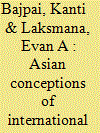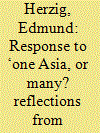|
|
|
Sort Order |
|
|
|
Items / Page
|
|
|
|
|
|
|
| Srl | Item |
| 1 |
ID:
191734


|
|
|
|
|
| Summary/Abstract |
How do major Asian states regard the current international security order? Do they agree or disagree among themselves? This is an introduction to a special section on ‘Asian conceptions of international order: what Asia wants’. It draws on articles analysing the stances of China, India, Japan, South Korea, Indonesia, Malaysia, Singapore, Thailand, Philippines and Vietnam towards the existing international security order usually described as a liberal international order (LIO). It argues that Asian states substantially support the main constitutive and regulatory norms and institutions of the LIO, but they worry that the LIO does not consistently honour these norms. Asians disagree on the centrality of political liberalism, but even Japan and South Korea, the most liberal states, are uncomfortable with strident criticism, punishment and the exclusion of less liberal states. Asians also disagree on the role of US alliances: some are strongly supportive, some are ambivalent and some are negative. Finally, Asians disagree on how they voice dissatisfaction. Japan and South Korea supplement existing norms and institutions as a way of transcending the limitations of the LIO; south-east Asian states promote ASEAN's mediatory role for peace and security above and beyond existing global arrangements; and Indonesia, India and China want to move from being norm takers to becoming norm shapers. The introduction ends with six policy implications.
|
|
|
|
|
|
|
|
|
|
|
|
|
|
|
|
| 2 |
ID:
144213


|
|
|
|
|
| Summary/Abstract |
The idea of Asia as a unity has appealed both to Europeans interested in differentiating themselves from a threatening, if inferior, Asiatic ‘other’, and to Asians keen to mark their distance from an alien and alienating Europe and West. For both groups, Asia is a useful term of alterity, although the place of ‘us’ and ‘them’ is reversed. Near the beginning of his lecture Sanjay Subrahmanyam remarks that, ‘in the play between the -emic and the -etic, the insider's and the outsider's perspective, a concept like “Asia” falls decidedly on the side of the -etic’. This point is reinforced by the fact that the European concept of Asia goes back to the Ancient Greeks (as Subrahmanyam notes), whereas the interest of Asian insiders in the concept of a homogeneous Asia is a modern phenomenon, a reaction against the assumption of superiority inherent in Western imperialism and neo-imperialism. In the case of both the European and the Asian conceptions, however, it is the viewpoint of the observer, rather than the empirical features of what is observed, that gives shape and meaning to the concept. I will use this short response to take a look at Asia from a third perspective, one that is neither fully ‘insider’ nor ‘outsider’ in character, namely that of the early modern Armenians, whose travels took them across the length and breadth of Asia, and Europe too.
|
|
|
|
|
|
|
|
|
|
|
|
|
|
|
|
|
|
|
|
|